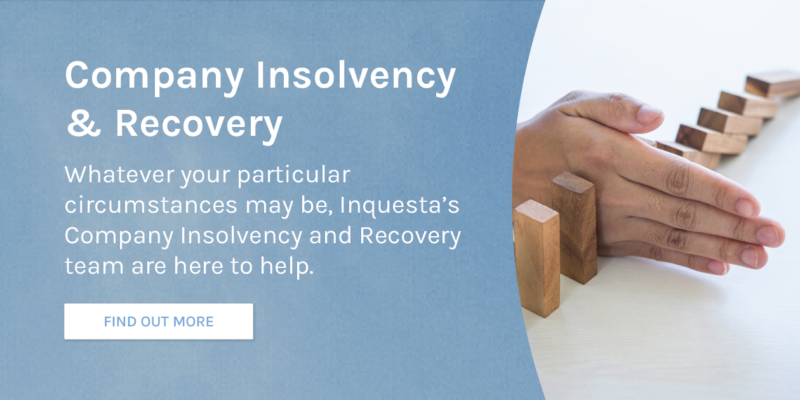The consequences of financial distress for a business can be severe — potentially leading to damaged reputations, lost jobs, and liquidation. If you’re in such a difficult situation, turning to business insolvency experts can make the difference between closure and recovery. An expert will provide specialised advice, practical solutions, and the latest guidance, all designed to help you and your company overcome its current state of financial difficulty and return to some semblance of stability.
This blog details why hiring a business insolvency expert is so essential. We’ll explain what they can do for you, and how they assist companies in navigating their way through even the most challenging economic climates.
What Are Insolvency Experts?
Insolvency experts, or insolvency practitioners, are professionals who specialise in offering advice to business and individuals when it comes to managing situations of overwhelming debt and insolvency. Their expertise will encompass everything, from restructuring debt, to the liquidation process; ensuring creditors are paid.
For a business, these professionals will often be sought out during the most pressing times and will, in an ideal world, look for a solution that resolves a financial deficit while also trying to keep the lights on. This usually will include options like Company Voluntary Arrangements (CVAs), business restructuring efforts, and administration.
By utilising a tailored approach, based on extensive experience, insolvency experts will allow businesses to properly consider all the options available to them — while helping them to make a decision based on facts and reason, rather than as a reaction to the high-pressure situation they are in. This, in turn, affords them the best chance for recovery, or at the very least, facilitating as ordered a closure/exit as possible.
Signs That Your Business Needs an Insolvency Expert
It is an unfortunate reality that many company directors will hesitate to seek professional help, only to bring somebody on board once it’s too late. The earlier the expert intervention comes, the better. So if you’re experiencing mounting debts, issues with cash flow, or creditors are knocking on your door, it might be time to consult business insolvency experts.
Here are some of the most pressing warning signs that your company may need to consult a licensed insolvency practitioner:
- Debts Mounting: If your business is struggling to pay people on time (be that employees, suppliers, or creditors), you should see it as one of the most overt red-flags that your financial health is deteriorating and professional assistance might be required to right the ship.
- Cash Flow Problems: Issues with cash flow is one of the leading causes of a business being forced into insolvency. If you are no longer able to cover your operational expenses, it’s time you sought out some expert assistance.
- Persistent Losses: If you’ve experienced a sequence of unprofitable quarters, it might be time to stop chalking it off as an anomaly. It could instead indicate that your business model is no longer working as intended — meaning a restructuring could be ideal.
- Increased Creditor Pressure: If you find that creditors are consistently chasing payments, or even issuing statutory demands, the situation is approaching breaking point and you need an insolvency expert on your side immediately.
If any of these signs appear, contacting insolvency experts can go a long way towards preventing your company from spiralling further into debt, and even being forced into liquidation and closure in the long-run.

How Insolvency Experts Help Businesses
The role of business insolvency experts extends far beyond just helping to close a company and liquidate its assets. Their primary goal is always to minimise the chance of closure where possible, while also maximising creditor repayment. Additionally, if rescue becomes non-viable as an option, they will look to minimise the damage to creditors, employees, and the company’s directors/owners.
Here are a selection of the many ways in which insolvency professionals are able to help business owners to navigate times of financial pressure:
1. Assessing the Financial Health of the Business
One of the very first measures insolvency experts often look to take when brought on board is to conduct a thorough review of the business in question’s finances. They will look to assess current levels of cash flow, revenue streams, liabilities, and debts.
This is important as only once they fully understand the company’s financial position can they truly recommend the best possible course of action. It acts as a foundation from which well-informed decisions can be made.
2. Formulating a Rescue Plan
The primary objective of business insolvency experts will generally be to try and rescue a struggling company, if possible. This will often involve poring over the different recovery methods out there, including restructuring debts, negotiating/renegotiating with creditors, and more.
Depending on the severity of the situation, and the extent of the issues, the following options may be recommended by your insolvency experts:
- Company Voluntary Arrangement (CVA): A CVA will allow your business to come to a mutually-beneficial agreement with creditors by which you are able to pay off debts across a fixed period rather than when it is currently due. This is an excellent method to avoid liquidation, allow trading to continue, while also getting creditors what it owed — with as minimal fuss as possible.
- Business Restructuring: An insolvency expert can oversee the restructure of your business by cutting or reducing non-essential expenses, selling off parts of the business that are not ‘pulling their weight’, or even seeking out an external manager who can help turn a bad situation around (should one be necessary).
- Administration: Reserved for cases where more immediate forms of restructuring are necessary, this will involve placing your business into administration, providing some much-needed breathing room by which you can reorganise your finances and turn things around.
3. Negotiating with Creditors
If you’re facing down the barrel of serious financial issues, that last thing you want are incessant emails, letters, and phone calls from creditors seeking repayment. However, ignoring such contact can only lead to the escalation of problems — until ultimately they seek the court’s assistance in finding a resolution.

Insolvency experts can act as intermediaries between you and your creditors. They can initiate and oversee negotiations to extend your payment terms, reduce interest rates, or potentially even write off some of the debt in favour of a guarantee of prompt repayment of the remainder — relieving some pressure and affording your business time to recover.
The beauty of appointing an insolvency practitioner to handle this is that these experts will be highly experienced when it comes to dealing with creditors. This means that they will understand the many nuances of proper and effective negotiations. These specialists know the best arguments to present, and how they can get creditors on side towards as favourable a repayment plan as possible — ultimately avoiding more drastic action, such as winding-up petitions.
4. Navigating Legal Complications
The insolvency process is littered with a litany of legal complications. For the uninitiated, it’s possible to commit wrongful trading without even realising you’re doing it.
Business insolvency experts are able to protect you against legal risks and ensure everything is 100% compliant with any and all insolvency laws. This is vital to helping you avoid legal issues, penalties, and even personal liability.
5. Liquidation and Closure (If Necessary)
If your firm’s situation cannot be salvaged, insolvency experts can help manage the situation towards the most orderly liquidation possible. They will be on hand to oversee the sale of assets to pay off debts (distributing any funds remaining to stakeholders), and ensuring that the closure is done in accordance with the law.
Liquidation is often presented as a last resort, the end of the road, the worst possible scenario. However, doing it properly and at the right time can prevent directors and owners from facing potentially long-lasting financial and legal implications. This can allow key management figures to start afresh without being handcuffed to the already sunken ship.
Why Early Action Is Critical
As touched upon earlier, one of the most common mistakes we see at Inquesta is that directors delay seeking help from licensed business insolvency experts in order to save both face and money. They make every possible attempt to resolve things themselves. While this can be seen as commendable, ultimately it is likely to cost you far, far more in the long-run than it would to just contact the experts as soon as an issue rears its ugly head.
This is because, as we see dozens of times each year, by the time these businesses do get us on board, options have already been severely depleted. This can leave liquidation as the only viable path remaining. On the other hand, if afforded proper time, we can provide a much more encompassing range of solutions, many of which can allow the business to continue trading.
If your business is showing any signs of financial trouble, it’s vital that you act quickly and decisively. The sooner you seek advice, the more doors you will leave open. Insolvency experts can offer a fresh perspective to a bad situation, one that’s unclouded by emotions, enabling them to guide you through tough decisions with the backing of logic and practical advice.




